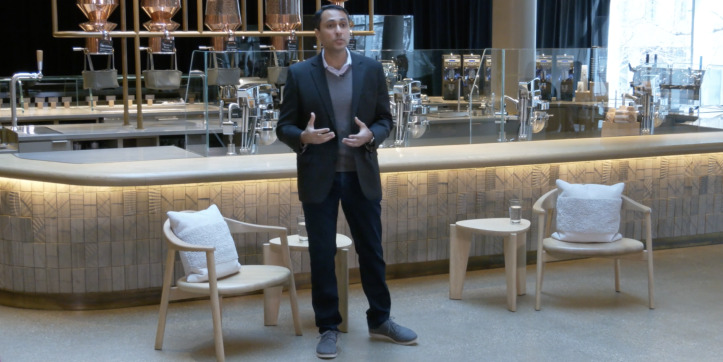To Improve Workplace Culture, Employers Should Think About Religious Diversity
March 16, 2022

Diversity, equity, and inclusion leaders in corporate spaces regularly assert that engaging diversity yields profit, innovation, production, and a sense of purpose. However, their definition of diversity is often confined to socio-economic status, race, and gender when it also ought to include diversity of thought, religion, and ways of knowing. To create productive and innovative workplaces, we need to embrace diversity in all its forms—and begin preparing the next generation of leaders to do so.
Unfortunately, colleges may not be prioritizing learning about religion and worldview compared to learning about other identities like race, gender, and sexuality. In a recent study of religious diversity and interfaith engagement on campus, less than half of the students surveyed said they spent time learning about people from different religious and non-religious groups while in college. A small minority participated in programming like religious diversity trainings (9%) or dialogues (14%) designed to improve their interfaith competencies.
Few institutions of higher learning have embraced religious diversity as a professional and employable competency as much as St. Olaf College in Northfield, Minnesota.
Interfaith understanding and skills are increasingly important in today’s globalized workforce. According to a recent study by the Public Religion Research Institute (PRRI), “A majority of Americans … say they frequently interact with people who do not share their political party (53%) or religion (51%) at work.” Employers need employees who can work effectively with religiously and ideologically diverse colleagues, yet not all college students are being adequately prepared to meet this challenge.
Recent graduates will encounter more religious diversity at work than they experienced at their university and college and will likely be underprepared to positively engage with their peers, supervisors, clients, and community. St. Olaf College Lutheran Center for Faith, Values, and Community is proactively meeting this need and preparing its students. In 2021, St. Olaf launched a seminar, Interfaith Leadership for the 21st Century Workplace, that focused on equipping students and engaging their alumni in six key disciplines and sectors: social impact and education, business, law/policy/government, arts, health care, and STEM. The goal of the seminar was to increase participants’ radar screen for religious diversity, create opportunities to bring together people who orient around religion differently and highlight the way religion and spirituality manifest in the work environment.
For many, talking about religion and working with individuals or groups that express their beliefs differently can be uncomfortable. This is exacerbated by our tendency to stick with those who are like us, as Caroline Mehl at OpenMind would say, we are more likely to respond from emotion than from reason, fearing what we do not know or understand, perpetuating gaps in our knowledge, increasing biases and stereotypes, and not leveraging the diversity and contributions of all. For instance, do you know who on your team is unable to work on Friday night, or where your colleagues can go to pray or meditate during the day? Are you aware that some Muslims consider it taboo to shake hands with someone of different gender and that many religious traditions call believers to abstain from alcohol consumption?
Not knowing these nuances can lead to colleagues and peers feeling isolated as they are unable to participate in company-sanctioned social events, feeling unwelcomed or not considered as there is no space allotted for prayer or meditation time, and unappreciated as others begin to believe that colleagues who aren’t working on Friday night are not doing their fair share of the work. These misunderstandings and gaps in knowledge can contribute to the morale, productivity, culture, and retention. To learn more, read Building Interfaith Community at Work by Farah Siddiqui, former Global President and Co-Founder of Faithforce.
As the inaugural Lutheran Center Fellow at St. Olaf, Eboo Patel led the Interfaith Leadership for the 21st Century Workplace Seminar. Here is a short clip of Eboo describing the religious profile of the U.S. During the seminar, we also highlighted various interfaith leaders within the fields of social impact and education, business, law/policy/government, arts, health care, and STEM to share how religious diversity impacts the current work environment and the evolution of each field. To increase participants resonating with the topic we shared articles, publications, and webinars that spoke to the importance of interfaith leadership and interfaith professional competencies within the sectors.
Share
Related Articles
American Civic Life
American Civic Life
Faith Based Efforts Work in Vaccine Uptake: Now Let’s Make it Easy
Higher Education

Eboo Patel, Founder of IFYC, gives a talk at Starbucks.
We shared Dr. Aamir Hussain’s work and experiences in various Long Island, New York City hospitals during the height of the COVID-19 pandemic where he told us, “Healthcare professionals of all backgrounds are fighting this virus, not for any worldly rewards, but because we are called by our numerous faiths (or non-faith traditions) to serve mankind.” In another article and for the business sector we heard from Jacob Ratliff, Marketing Director at ashevilleMARKETER, that his interfaith leadership skills assisted him in cultivating relationships, increased his network and impact, and strengthened his ability to bring people together to work toward the common good. We also highlighted a previous webinar on Preparing Students for Interfaith Excellence in the Workforce, with Dr. Michael Burns, a biology professor at Loyola University Chicago; Dr. Barbara McGraw, professor of Social Ethics, Law, and Public Life at St. Mary’s University of California; and Dr. Joset Brown, an assistant professor in the undergraduate nursing program at William Paterson University in New Jersey. Panelists described the extent to which college students are equipped with interfaith knowledge and skills as they prepare to enter the workforce and how they have developed strategies for cultivating interfaith learning and development as a dimension of career preparation on their own campuses. In the webinar, Dr. Brown shares that “We often underplay the role that religion and faith have on the lives of our patients and their healing process.”
“Healthcare professionals of all backgrounds are fighting this virus, not for any worldly rewards, but because we are called by our numerous faiths (or non-faith traditions) to serve mankind.”
“Healthcare professionals of all backgrounds are fighting this virus, not for any worldly rewards, but because we are called by our numerous faiths (or non-faith traditions) to serve mankind.”
Back at St. Olaf, alumni from the six fields led small group conversations to deepen participants’ understanding, make meaning for their own contexts, and to hear from professionals in the field. They wrestled with case studies, thought about possible solutions, and discussed the barriers and possible successes of intervening when there wasn’t an accommodation for their religious beliefs, how to best support a colleague whose dietary limitations weren’t considered when the team ordered lunch or planned a social event. They also discussed ways of being proactive in engaging religious diversity in the workplace as a norm. St. Olaf is paying attention to an issue that is emerging in workplace contexts throughout the country, and models of this can be found in Faithforce at Salesforce and Inter Belief Network at Google.
Bryan Shealer, Associate Director of Career Development & Coaching at Piper Center for Vocation and Career, reflecting on the value of the seminar for our career coaches, said he found the seminar “truly meaningful. Partnering with Eboo Patel and the Interfaith Youth Core has made us a better career center and furthered our efforts to create a more diverse, equitable, and inclusive workforce in the 21st century.”
To learn more about the opportunity to have IFYC lead a seminar on your campus, please reach out to Teri Simon at [email protected].
Does your company’s time off policy reflect its religious diversity? Read IFYC vice president Amber Hacker’s piece, Are Non-Christian Employees Represented in Your Holiday Policies?
Janett I. Cordovés is Interfaith America Director of Higher Education Partnerships.



